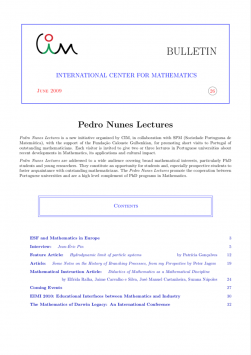Editorial
1-2
Pedro Nunes Lectures is a new initiative organized by CIM, in collaboration with SPM (Sociedade Portuguesa de Matemática), with the support of the Fundação Calouste Gulbenkian, for promoting short visits to Portugal of outstanding mathematicians. Each visitor is invited to give two or three lectures in Portuguese universities about recent developments in Mathematics, its applications and cultural impact.
The European Science Foundation (ESF), http://www.esf.org, is an independent organisation based in Strasbourg aiming to Advance European re- search in all areas and to explore new directions of research at the European level. The ESF covers Humanities, Life, Earth and Environmental Sciences, Medical Sciences, Physical and Engineering Sciences and Social Sciences and represents an important interface through its membership, currently 78 different research organisations in 30 countries, extending beyond the borders of the European Union.
Jean-Éric Pin
Mário Branco
5-11
Let us start with your initial academic path. Your first university degree is in Mathematics and then you did your third cycle thesis1 on automata, more precisely on Cernys Conjecture, a conjecture that is still unsolved...
Hydrodynamic limit of particle systems
Patrícia Gonçalves
12-18
In these notes I present a classical particle system, namely exclusion type processes evolving on the one-dimensional lattice. I consider both settings, the nearest neighbor jumps of symmetric and asymmetric rates and long-jumps. For nearest neighbor jumps, for the symmetric and asymmetric case, one obtains the particle density evolving according to the heat equation and the inviscid Burgers equation, respectively, while for the long-jumps one gets to the fractional heat equation. From this global behavior I present a simple argument to obtain the limit distribution for the position of a tagged particle from the joint distribution of the empirical density of particles plus the current through the origin.
Some Notes on the History of Branching Processes, from my Perspective
Peter Jagers
19-23
Few fields within the mathematical sciences cherish their past like branching processes. Ted Harris’s classical treatise from 1963 opens by a terse but appetising two-page flashback. Three years later, David Kendall’s elegant overview was published, and like Charles Mode in his monograph (1971), I could borrow from that for the historical sketch opening in my 1975 book, but also add some observations of my own.
Didactics of Mathematics as a Mathematical Discipline:A Portuguese reflection upon a Kleinean challenge
Elfrida Ralha
Jaime Carvalho e Silva
José Manuel Castanheira
Suzana Nápole
24-26
The famous German mathematician Felix Klein (Dus- seldorf, 25th April, 1849 - Gottingen, 22nd June, 1925) is well known both as a distinguished researcher (non- euclidean geometry, group theory and theory of functions) and as a remarkable teacher
Coming Events
27-29
- July, 02-04, 2009: BCAM-CIM Workshop on Applied Mathematics,
- July, 07-10, 2009: Workshop on Quantum Ef- fects in Biological Systems (QuEBS 2009),
- July, 2009: Pedro Nunes Lectures,
- July, 2009: Kinetics and statistical methods for complex particle systems,
- September, 11, 2009: Jornada SPM/CIM/CMAT “Dia das Equações"
- October 1-4, 2009: Didactics of Mathematics as a Mathematical Discipline (a XXIst century Felix Klein’s follow up),
- November 23-24, 2009: The Mathematics of Darwin Legacy,
The International Commission on Mathematical Instruction (ICMI) and the International Council for Industrial and Applied Mathematics (ICIAM)..
In the framework of the “Darwin year”, CIM organizes a conference in collaboration with the European Society for Mathematical and Theoretical Biology at the University of Lisbon, on the occasion of the 150th anniversary of the publication of ”On the Origins of Species by Means of Natural Selection”.
